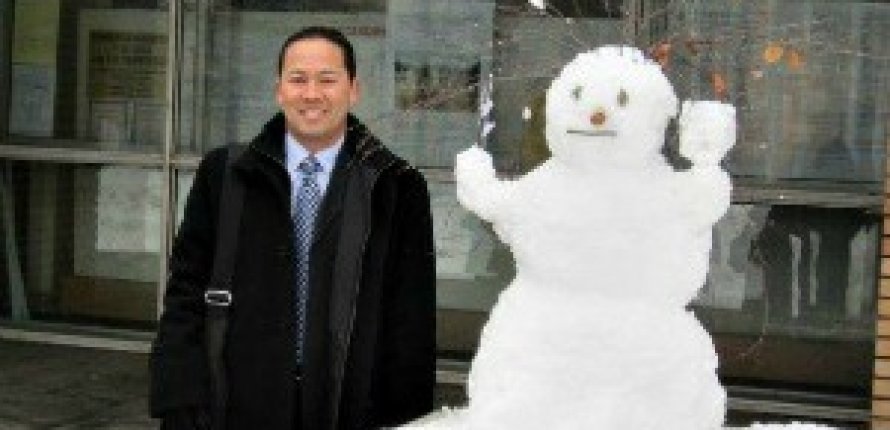The Answer May Be "Yes"

Charles Sasaki, Fulbright Alumni Ambassador
Dean of Arts & Sciences at University of Hawaii - Kapi'olani Community College
November 2012, Community Colleges Administrator Seminar to Russia
March 2008, International Education Administrator Seminar to Germany
As a minority scholar and a relatively young administrator working at a community college, I had never thought that a Fulbright was within the realm of possibility. Sure, I’d recently participated in a few other international exchanges to Japan and the United Kingdom, but a Fulbright U.S. Scholar Program award was for Ivy League professors, not me. I didn’t know anyone who’d received a Fulbright and such an award seemed unattainable. But to my surprise, I took a look at the Catalog of Awards and found a project that seemed to be a good fit. Convinced I would need to apply over and over again until I became competitive, I held my breath and submitted an application anyway.
By the fall of 2008, I found myself packing my bags for Germany as part of the International Education Administrators (IEA) seminar – headed to a part of the world that I’d never seen and about which I knew very little. My IEA cohort included roughly equal numbers of colleagues representing career services, international programs, and a handful of other senior student affairs administrators like myself. We were from all parts of the country and every institutional type.
 Obama election
Obama election
In true German fashion, the seminar was flawlessly planned and executed allowing for better understanding of the cultural and educational contexts of the German students at my home institution. We attended seminars about Bologna Process reforms, the centralized Deutsches Studentenwerk, and visited the Berlin School of Economics and other corporate cooperative education sites that demonstrated the value of a distinctively German hands-on pedagogy. Other less formal learning happened as well, such as my new German friends who were eager to hear about the home state of our newly-elected President (“No, I’ve never met Barack Obama.” “Yes, our President likes to surf.”)
Several years later, and now in a new job at a new institution, I learned of yet another Fulbright opportunity. The Community College Administrators Seminar (CCAS) was a new program that sounded intriguing. Each year, CCAS sent five people abroad to gain new information about Russian higher education and to share key information about the two-year college model abroad. I was intrigued by the program description and knew that it would help me to become more effective at my own institution – with its large international student enrollment and important global education mission. Previous participants in the first two cohorts were, however, for the most part, college presidents. I applied anyway. To my surprise, I was selected for the program. Five senior-level administrators traveled to Russia to build awareness of U.S. community colleges and forge new institutional partnerships.
 Community College Administrators Seminar (CCAS)
Community College Administrators Seminar (CCAS)
The CCAS was fast-paced, invigorating, and as complex as the nation that we were visiting. Our itinerary was constantly in flux and the following day’s plans were rolled out as the seminar progressed. An article in the local newspaper had generated interest in my visit. I ended up with invitations to give talks to a wide range of audiences: universities, the local association of English teachers, an institute of the performing arts, and to culinary arts students eager to learn about the food traditions of the Pacific. A fun and particularly memorable experience was the evening spent with the Belgorod English Club – a boisterous group of locals who gathered weekly after work to practice their language skills in a local café (that I’d have never found on my own.)
These awards were not only enriching for me personally, but provided me new knowledge which could be used to make significant and impactful change back at home. For Student Affairs staff, I ran workshops about the impact that Bologna reforms would have on year-
 At the Berlin School of Economics
At the Berlin School of Economics
to-year enrollment. We adjusted the content and delivery of our student orientation program to be more relevant to incoming scholars from EU nations. A MOU that was signed with Belgorod Technical University allowed us to host an English faculty member from Russia on exchange here in Hawaii. Adapting the model of my own IEA and CCAS, my institution subsequently hosted groups of scholars from Russia, Indonesia, India, China, and Japan. And, most surprisingly, publicity in Honolulu about my own Fulbright connected my institution with a vibrant and well-organized Russian community in Honolulu that no one at my college previously knew of.
My Fulbright IEA and CCAS awards stand out as highlights in a career that has already been deeply fulfilling and incredibly rewarding. If a young, non-traditional academic like me can become a Fulbright scholar, so can you.
